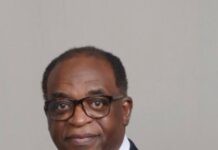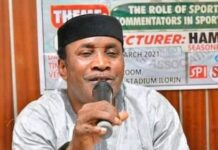Ahmadu Bello University’s celebration of its 50th Anniversary which started on October 4 came to a climax last Saturday, November 24, with this year’s convocation ceremony on its main campus in Samaru, Zaria.
The highlight of the convocation was the award of honourary degrees to four of the Third World’s leading citizens; the Emir of Kuwait, Sheikh Sabah Al-Ahmad Al-Jabar Al-Sabah, the original founder of the well-known Sheikh Sabah College, Kaduna, now Sardauna Memorial College, General Ibrahim Badamasi Babangida, arguably Nigeria’s greatest political engineer whose eight years as military president cast the mould in which the country’s political economy has operated since 1986, General Theophilus Yakubu Danjuma, incontrovertibly the country’s most powerful army chief, since turned one of its most generous philanthropists, and the elderly Alhaja Abibatu Mogaji, one of the country’s most enduring merchants as Iyalode of Lagos, the country’s commercial and industrial capital, and godmother (in the best sense of the word) of Lagos politics, the hotbed of Nigeria’s politic.
The journey to last Saturday’s convocation actually began in 1961 when the Ashby Commission into the future of tertiary education in Nigeria recommended that a university should be established in Northern Nigeria, presumably to balance those established in the East – Nsukka University, the first fully fledged university in Nigeria – and the earlier University College, Ibadan, in the West, which started as an affiliate of London University.
The North’s regional government, under its first and only premier, Sir Ahmadu Bello, Sardaunan Sokoto, accepted the recommendation. Accordingly it initiated a bill which the region’s House of Assembly passed in April 1961 establishing the university. It began full operation in October 1962 and was named after the premier who, subsequently, was appointed its first chancellor on November 23.
Since then the university, according to its current and 13th Vice-Chancellor, Professor Abdullahi Mustapha, himself an alumnus, has produced over 800,000 students, probably the largest any university has produced in Nigeria and even on the continent, bar the ancient and more famous Al-Azhar in Cairo, Egypt. The university is certainly the largest in Nigeria, with a student and staff population of nearly 40,000 spread on two campuses in Samaru and Kongo, both in Zaria, with 12 faculties – ten in Samaru and two in Kongo – split into 95 departments and several centres of research.
Obviously in sheer number, ABU has been the university to beat. But its contribution to the development of the country and beyond goes well beyond quantity. Among its products have been some of the country’s leading judges, politicians, bureaucrats, professionals, businessman and women, you name it.
To give just one small example of the quality of students the university produced, take Daily Trust, the most successful newspaper in the North to date and one of the most successful in the country.
Most readers will agree with me that its back-page columns from Monday through Saturday are some of the most well read among the country’s newspapers. Three of the columns – Tuesdays’ by Sanusi Abubakar, the man who makes Economics read like a novel by Chinua Achebe, Wednesdays’ by this columnist, and Fridays’ by Adamu Adamu, the master satiristand humourist – are written by products of the university. Both Mahmud Jega, the human search engine and master of colloquialism who writes on Mondays, and Bala Muhammad, the highly readable Saturday columnist with a wonderful and unique sense of humour, who went to Bayero University, Kano, are ABU products by proxy; BUK was literally sired by ABU.
And then, of course, the man who has made all this possible, Kabiru Yusuf, the newspaper’s current chairman and founder, also went to ABU.
And what you see of Daily Trust is also true of virtually all spheres of life in Nigerian and beyond.
Sadly much of this has become History, thanks mainly to the phenomenal increase in the population of the university over the years.
Today this population is light years away from what it was at the beginning, which was about 400. The current population is even many times more than it was when yours sincerely joined the second set of the university’s Arts and Social Science students of the School of Basic Studies on the Samaru campus in 1971. The school had been established in 1970 to increase the pool of secondary school students of Northern origin able to gain admission into the university through the then Higher School Certificate. It started with Arts and Social Science students only and admitted its first Science students in 1971.
Predictably the geometric rise in the university’s population has come with its problems that have led, among other things, to a sharp drop in the quality of its products. The black and white picture you see in this column was of a seminar group in the SBS History class led by one of the school’s History teachers, Mr. Festus Ogunlade, since retired as a professor of education. Seated second from the right with a Che Guavara hat is this reporter, then a not-so-hot-headed left wing radical.
As the reader can see, the seminar group had only eight students. It was one of few which each class was broken into for in-depth discussion of topics. This meant students received the kind of attention that university students almost everywhere in the country today can only now imagine, if at all.
About 37 years after this picture was taken, this columnist returned to teach Journalism in the university after a career of reporting for, editing and managing the New Nigerian, the country’s once most successful government owned newspaper which, in its heydays between the late sixties and early eighties, was even more outspoken than private newspapers. What he saw of the very classes he attended as a student of SBS was akin to a culture shock.
Far from the modest size of classes of those yesteryears, students today often struggled to get seats and avoid hanging on windows and at times on corridors to listen to their teachers. Worst still is the shortage, sometimes even lack, of tools and equipment for practical knowledge.
In the circumstances quality was bound to suffer. This means ABU’s challenge as it moves into the next half a century is how to restore and, needless to say, surpass its yesteryears of glory.
There is much the university can do to meet this challenge. It can do a lot, for example, to get its alumni to give back to it in cash and kind as much as it gave them, if not more. It can also generate more internal revenue than it does at the moment. It can also be more creative than it has been in getting Foundations to endow courses and programmes in the university.
However, there is, of course, a limit to what it can do. My experience in teaching in the university in the last four semesters or so suggests the single biggest problem is the abysmal quality of its intake; the vast majority of my students barely know their grammar, never mind the poor quality of their knowledge. And what you see in ABU is what you get in most universities in the country.
The solution to this problem lies essentially with our state and local governments that are supposed to be responsible for our secondary and primary schools. Clearly they have been criminally negligent of their duties for proper education at these two levels. Until states and local governments take this responsibility seriously by investing enough in education in a way that is efficient and transparent, all our universities including, of course, my Alma Mata, will never match their quality of yesteryears no matter what they do.



